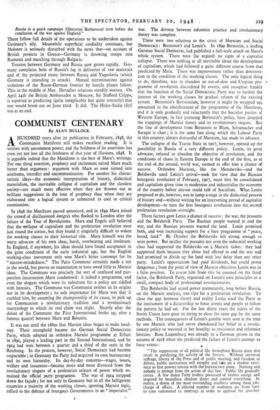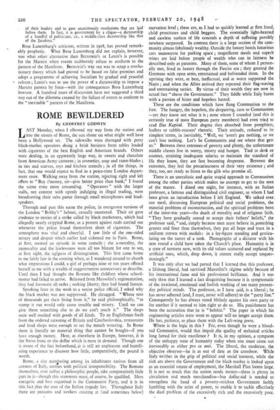COMMUNIST CENTENARY
By ALAN BULLOCK
AHUNDRED years after its publication in February, 1848, the Communist Manifesto still makes -excellent reading. It is written with uncommon power, and the boldness of its assertions has even yet not lost all the freshness of that year of illusions, 1848. It is arguable indeed that the Manifesto is the best of Marx's writings. For one thing assertion, prophecy and incitement suited Marx much better than argument: argument with Marx so soon turned into anathema, interdict and excommunication. For another his charac- teristic ideas—the economic interpretation of history, dialectical materialism, the inevitable collapse of capitalism and the classless society—are much more effective when they are thrown out as brilliant suggestions in the heat of prophecy than when they are elaborated into a logical system or submitted to cool or critical examination.
In 1848 the Manifesto passed unnoticed, and in 1849 Marx joined the crowd of disillusioned émigrés who, flocked to London after the failure of the Year of Revolutions. Marx and Engels still believed that the 'ollapse of capitalism and the proletarian revolution were just round the corner, but they found it singularly difficult to waken the working classes to their historical role. Marx himself was the worst advocate of his own ideas, harsh, overbearing and intolerant. In England, if anywhere, his ideas should have found acceptance in the grim conditions of the early industrial age, but the English working-class movement only won Marx's bitter contempt for Its " narrow-mindedness." The Paris Commune certainly made a stir in the world, but proves on examination to have owed little to Marxist ideas. The Commune was precisely the sort of confused and pur- poseless insurrection Marx condemned: it lacked a programme, and even the slogans which were its substitute for a policy are riddled with heresies. The Commune was Communist neither in its origins nor in its development ; its sole importance for Marx was that it enabled him, by assuming the championship of its cause, to pick up for Communism a revolutionary tradition and a revolutionary martyrology to which its real claim was slight. Shortly after the defeat of the Commune the First International broke up, after a famous quarrel between Marx and Bakunin.
It was not until the 188os that Marxist ideas began to make head- wm. Their stronghold became the German Social Democratic Party, which adopted an orthodox Marxist programme at Erfurt in 1891, played a leading part in the Second International, and by 1914 had won between a quarter and a third of the seats in the Reichstag. In the process; however, Social Democracy had become respectable ; in Germany the Party had acquired its own bureaucracy and its own hierarchy. Its day-by-day concerns—wages, hours, welfare and insurance—became more and more divorced from the revolutionary slogans of a proletarian seizure of power ivhiciti re- mained the official party programme. The war of 1914 stripped down the facade ; for not only in Germany but in all the belligerent countries a majority of the working classes, ignoring Marxist logic, rallied to the defence of bourgeois Governments in an " imperialist "
war. The divorce between reformist practice and revolutionary theory was complete.
There were two solutions to the crisis of Marxism and Social Democracy: Bernstein's and Lenin's. In 1899 Bernstein, a leading German Social Democrat, had published a full-scale attack on Marx's whole system. There were (he argued) no signs of a capitalist collapse. There was nothing at all inevitable about the development of capitalism, which had followed a quite different course from that predicted by Marx. There was improvement rather than deteriora- tion in the condition of the working classes. The only logical thing to do, therefore, was to abandon an out-of-date and Utopian pro-. gramme of revolution discredited by events, and recognise frankly that the function of the Social Democratic Party was to further the interest of the working classes by gradual reform of the existing system. Bernstein's Revisionism, however it might be wrapped up, amounted to the abandonment of the programme of the Manifesto, and it is only gradually and reluctantly that the Socialist parties of Western Europe, in fact pursuing Bernstein's policy, have dropped the trappings of Marxist theory and its revolutionary slogans. But the line of development from Bernstein to Blum, Schumacher and Saragat is clear ; it is the same line along which the Labour Party in this country, always distrustful of Marxism, has made its advance. The collapse of the Tsarist State in 1917, however, opened up the
possibility in Russia of a very different policy. Lenin, its great advocate, refused to abandon the objective of revolution, and the conditions of chaos in Eastern Europe at the end of the first, as at the end of& the second, world war, seemed to offer him a chance of success. Orthodox Marxists,. like the Mensheviks—and the
Bolsheviks until Lenin's arrival—took the view that the Russian bourgeois revolution' of February, 1917, must first be consolidated and capitalism given time to modernise and industrialise the economy of the country before anyone could talk of Socialism. What Lenin proposed to do, however, was to jump a stage in the dialectical process of history and—without waiting for an intervening period of capitalist development—to turn the first bourgeois revolution into the second proletarian revolution overnight.
Three factors gave Lenin a chance of success : the war, the peasants and the Bolshevik Party. The Russian people wanted to end the war, and the Russian peasants wanted the land. Lenin promised both, and won increasing support for a bare programme of " peace, bread, land." By October the Bolsheviks felt strong enough to seize power. But neither the peasants nor even the industrial working class had supported the Bolsheviks on a Marxist ticket: they had suppbrted them because they alone had offered to end the war and had promised to divide up the land with less delay than any other party. Lenin's opportunism had paid dividends, but could prove dangerous ; from the point of view of Marxist objectives Lenin was in a false position. To rescue him from this he counted on the third factor, the Bolshevik Party, organised on Lenin's own principles as a small, compact body of professional revolutionaries.
The Bolsheviks had seized power prematurely, long before Russia, on the Marxist analysis, was ripe for a proletarian revolution. To close the gap between theory and reality Lenin used the Party as the instrument of a dictatorship to force events and people to follow the pattern he had set. For the last thirty years the rulers of the Soviet Union have gone on trying to close the same gap by the same methods. The consequences of Lenin's gamble were seen at the time by one Marxist who had never abandoned her belief in a revolu- tionary policy or wavered in her hostility to revisionist and reformist heresies. Rosa Luxemburg was already in' a German prison in the autumn of 1918 when she predicted the failure of Lenin's attempt to force events : .
"The suppression of all political life throughout Russia must also result in paralysing the activity of the Soviets. Without universal suffrage, liberty of the Press and of public meeting, and freedom of debate, public institutions will atrophy and take on a shadow exist- ence so that powers remain with the bureaucracy alone. Nothing and nobody is exempt from the action of this law. Public life gradually ceases. A few dozen Party leaders possessed of tireless energy and inspired by boundless idealism direct and control everything. In reality, a dozen of the most outstanding intellects among them.take charge of affairs. A selected number of workmen are from time to time summoned to meetings in order to applaud the speeches
of their leaders and to pass unanimously resolutions that are laid - before them. In fact, it is government by a clique—a dictatorship of a handful of politicians, i.e., a middle-class dictatorship like that of the Jacobins."
Rosa Luxemburg's criticism, written in 1918, has proved remark- ably prophetic. What Rosa Luxemburg did not explain, however, was what other alternative than Bernstein's or Lenin's is possible for the Marxist when events stubbornly refuse. to conform to the pattern of the Manifesto. Bernstein's way out was to scrap a revolu- tionary theory which had proved to be based on false premises and adopt a programme of achieving Socialism by gradual and peaceful • reform ; Lenin's was to use the power of a dictatorship to impose a Marxist pattern by force—with the consequences Rosa Luxemburg foresaw. A hundred years of discussion have not suggested a third way out of the dilemma created by the failure of events to conform to the " inevitable " pattern of the Manifesto.































 Previous page
Previous page